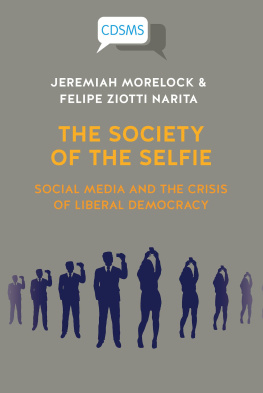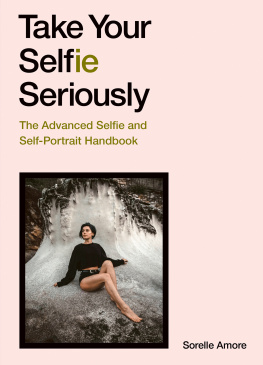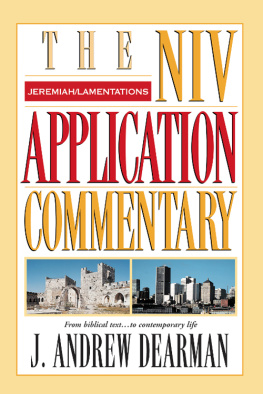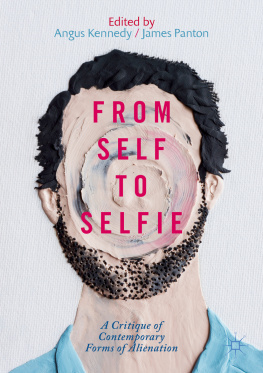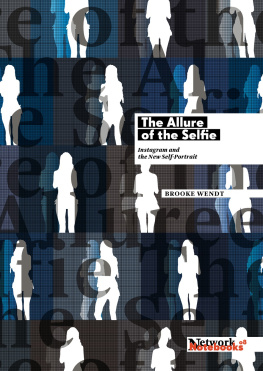Jeremiah Morelock - The Society of the Selfie
Here you can read online Jeremiah Morelock - The Society of the Selfie full text of the book (entire story) in english for free. Download pdf and epub, get meaning, cover and reviews about this ebook. City: London, year: 2021, publisher: University of Westminster Press, genre: Politics. Description of the work, (preface) as well as reviews are available. Best literature library LitArk.com created for fans of good reading and offers a wide selection of genres:
Romance novel
Science fiction
Adventure
Detective
Science
History
Home and family
Prose
Art
Politics
Computer
Non-fiction
Religion
Business
Children
Humor
Choose a favorite category and find really read worthwhile books. Enjoy immersion in the world of imagination, feel the emotions of the characters or learn something new for yourself, make an fascinating discovery.
- Book:The Society of the Selfie
- Author:
- Publisher:University of Westminster Press
- Genre:
- Year:2021
- City:London
- Rating:4 / 5
- Favourites:Add to favourites
- Your mark:
- 80
- 1
- 2
- 3
- 4
- 5
The Society of the Selfie: summary, description and annotation
We offer to read an annotation, description, summary or preface (depends on what the author of the book "The Society of the Selfie" wrote himself). If you haven't found the necessary information about the book — write in the comments, we will try to find it.
The Society of the Selfie — read online for free the complete book (whole text) full work
Below is the text of the book, divided by pages. System saving the place of the last page read, allows you to conveniently read the book "The Society of the Selfie" online for free, without having to search again every time where you left off. Put a bookmark, and you can go to the page where you finished reading at any time.
Font size:
Interval:
Bookmark:
Social Media and the Crisis of Liberal Democracy
Jeremiah Morelock and Felipe Ziotti Narita
Critical, Digital and Social Media Studies
Series Editor: Christian Fuchs
The peer-reviewed book series edited by Christian Fuchs publishes books that critically study the role of the internet and digital and social media in society. Titles analyse how power structures, digital capitalism, ideology and social struggles shape and are shaped by digital and social media. They use and develop critical theory discussing the political relevance and implications of studied topics. The series is a theoretical forum for internet and social media research for books using methods and theories that challenge digital positivism; it also seeks to explore digital media ethics grounded in critical social theories and philosophy.
Editorial Board
Thomas Allmer, Mark Andrejevic, Miriyam Aouragh, Charles Brown, Melanie Dulong De Rosnay, Eran Fisher, Peter Goodwin, Jonathan Hardy, Kylie Jarrett, Anastasia Kavada, Arwid Lund, Maria Michalis, Stefania Milan, Vincent Mosco, Safiya Noble, Jack Qiu, Jernej Amon Prodnik, Sarah Roberts, Marisol Sandoval, Sebastian Sevignani, Pieter Verdegem, Bingqing Xia, Mariano Zukerfeld
Published
Critical Theory of Communication: New Readings of Lukcs, Adorno, Marcuse, Honneth and Habermas in the Age of the Internet
Christian Fuchs
https://doi.org/10.16997/book1
Knowledge in the Age of Digital Capitalism: An Introduction to Cognitive Materialism
Mariano Zukerfeld
https://doi.org/10.16997/book3
Politicizing Digital Space: Theory, the Internet, and Renewing Democracy
Trevor Garrison Smith
https://doi.org/10.16997/book5
Capital, State, Empire: The New American Way of Digital Warfare
Scott Timcke
https://doi.org/10.16997/book6
The Spectacle 2.0: Reading Debord in the Context of Digital Capitalism
Edited by Marco Briziarelli and Emiliana Armano
https://doi.org/10.16997/book11
The Big Data Agenda: Data Ethics and Critical Data Studies
Annika Richterich
https://doi.org/10.16997/book14
Social Capital Online: Alienation and Accumulation
Kane X. Faucher
https://doi.org/10.16997/book16
The Propaganda Model Today: Filtering Perception and Awareness
Edited by Joan Pedro-Caraana, Daniel Broudy and Jeffery Klaehn
https://doi.org/10.16997/book27
Critical Theory and Authoritarian Populism
Edited by Jeremiah Morelock
https://doi.org/10.16997/book30
Peer to Peer: The Commons Manifesto
Michel Bauwens, Vasilis Kostakis and Alex Pazaitis
https://doi.org/10.16997/book33
Bubbles and Machines: Gender, Information and Financial Crises
Micky Lee
https://doi.org/10.16997/book34
Cultural Crowdfunding: Platform Capitalism, Labour and Globalization
Edited by Vincent Rouz
https://doi.org/10.16997/book38
The Condition of Digitality: A Post-Modern Marxism for the Practice of Digital Life
Robert Hassan
https://doi.org/10.16997/book44
Incorporating the Digital Commons: Corporate Involvement in Free and Open Source Software
Benjamin J. Birkinbine
https://doi.org/10.16997/book39
The Internet Myth: From the Internet Imaginary to Network Ideologies
Paolo Bory
https://doi.org/10.16997/book48
Communication and Capitalism: A Critical Theory
Christian Fuchs
https://doi.org/10.16997/book45
Marx and Digital Machines: Alienation, Technology, Capitalism
Mike Healy
https://doi.org/10.16997/book47
The Commons: Economic Alternatives in the Digital Age
Vangelis Papadimtropoulos
https://doi.org/10.16997/book46
Intellectual Commons and the Law: A Normative Theory for Commons-Based Peer Production
Antonios Broumas
https://doi.org/10.16997/book49
The Fight Against Platform Capitalism: An Inquiry into the Global Struggles of the Gig Economy
Jamie Woodcock
https://doi.org/10.16997/book51
AI for Everyone: Critical Perspectives
Edited by Pieter Verdegem
https://doi.org/10.16997/book55
Social Media and the Crisis of Liberal Democracy
Jeremiah Morelock and Felipe Ziotti Narita

Published By
University of Westminster Press
115 New Cavendish Street
London W1W 6UW
www.uwestminsterpress.co.uk
Jeremiah Morelock and Felipe Ziotti Narita 2021
Series cover concept: Mina Bach (minabach.co.uk)
First published 2021
Print and digital versions typeset by Siliconchips Services Ltd.
ISBN (Paperback): 978-1-914386-25-1
ISBN (PDF): 978-1-914386-26-8
ISBN (EPUB): 978-1-914386-27-5
ISBN (Kindle): 978-914386-28-2
DOI: https://doi.org/10.16997/book59
This work is licensed under the Creative Commons Attribution-NonCommercial-NoDerivatives 4.0 International License. To view a copy of this license, visit http://creativecommons.org/licenses/by-nc -nd/4.0/ or send a letter to Creative Commons, 444 Castro Street, Suite 900, Mountain View, California, 94041, USA. This license allows for copying and distributing the work, providing author attribution is clearly stated, that you are not using the material for commercial purposes, and that modified versions are not distributed.
The full text of this book has been peer-reviewed to ensure high academic standards. For full review policies, see: http://www.uwestminsterpress.co.uk/site/publish.
Competing interests: The authors have no competing interests to declare.
Suggested Citation: Morelock, Jeremiah and Narita, Felipe Ziotti. 2021. The Society of the Selfie: Social Media and the Crisis of Liberal Democracy . London: University of Westminster Press. DOI: https://doi.org/10.16997/book59. License: CC-BY-NC-ND 4.0
To read the free, open access version of this book online, visit https://doi.org/10.16997/book59or scan this QR code with your mobile device

Thanks are due to Lauren Langman, Christine Payne, Ayesha Hussain, Jared Friedman, Crystal Ward, Peter Hudis, Hille Haker, Constanza Filloy, Deepika Marya, Sally Mju, Sunayani Bhattacharya and Forrest Muelrath, whose insights and continued participation in the Research Network on Dialectics & Society (formerly the Critical Theory Research Network) reading and discussion groups have benefitted us greatly. Thanks are also due to Joanne, Lucy and Viana Morelock for the continuing patience and support. During the writing of this book, some topics and critical approaches were continuously discussed within postdoctoral trainings, conferences, talks and roundtables that supported our research: we thank Vnia Martino, Oswaldo Serra Truzzi, Agnaldo de Sousa Barbosa, Reinaldo Furlan, Srgio C. Fonseca, Jan Sowa, Alexandre Fontaine, Krystian Szadkowski, Tatiana Noronha de Souza, Genaro Alvarenga Fonseca, Alexandre M. Mendes, Hlio Alexandre Silva, Antonio Marco Ventura Martins and Rafael Cardoso de Mello. Special thanks to the So Paulo State University (UNESP), which provided funds to our academic exchanges. We would also like to thank Christian Fuchs, the anonymous reviewers and Andrew Lockett of the University of Westminster Press, whose attention and patience made this book viable.
CHAPTER 1
As we begin the second decade of the twenty-first century, two trends are immediately apparent. First, more than ever before, a substantial portion of our social relations are taking place online. Any kind of dichotomy between the real and the virtual has become difficult to sustain. Second, authoritarian and populist social movements have surged in popularity throughout the world, placing the stability of liberal democracy into question. In this book we argue that these two saturations of our social terrain, that of information technologies and that of authoritarian ideologies, are deeply related. This does not mean that in some simplistic sense informational technologies are the cause of authoritarian populism, nor vice versa. Our claim is that certain characteristics of neoliberal capitalism have dovetailed with and been amplified by the proliferation of information technologies and social media, and that these overdetermined tendencies have poked with increasing vigour at a selection of psychosocial wounds, already endemic to neoliberal capitalism, that tend to inspire authoritarian and populist reaction.
Font size:
Interval:
Bookmark:
Similar books «The Society of the Selfie»
Look at similar books to The Society of the Selfie. We have selected literature similar in name and meaning in the hope of providing readers with more options to find new, interesting, not yet read works.
Discussion, reviews of the book The Society of the Selfie and just readers' own opinions. Leave your comments, write what you think about the work, its meaning or the main characters. Specify what exactly you liked and what you didn't like, and why you think so.

